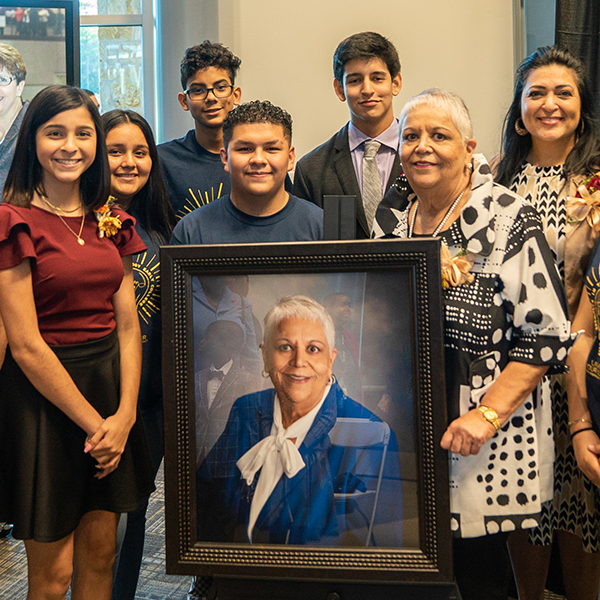- Sections :
- Crime & Public Safety
- Restaurants & Food
- Sports
- More
Categories
SHSU Professors Break Down the Science of Love

HUNTSVILLE, TX -- Even though Valentine’s Day is in the middle of the month, it can seem that love is in the air all throughout February. Love is frequently perceived as an abstract concept that cannot really be defined aside from how it makes you feel, but anything can be explained through the proper approach. We reached out to professors at Sam Houston State University in order to get a professional’s perspective on the topic.
When people talk about love, they typically say with a longing sigh, “It was love at first sight,” leaving their single friends staring at them, dumbfounded. The idea of looking at someone and instantly knowing that they are the person you want to spend the rest of your life with seems like a fairytale and that may be the case. These instances of people falling in love at first glance are actually evidence of how first impressions matter.
Lisa van Raalte, assistant professor in the department of communications studies, explains how love at first sight is similar to making a good first impression.
“The primacy effect suggests that we are better able to recall information in the very initial interaction than the middle or end. We make snap judgements of people on many factors including facial attractiveness, body shapes and clothing,” Van Raalte said. “As a consequence, if you see someone as very attractive and your initial reaction is rewarding, then you are likely going to seek out future interaction.”
Another idea that people hear when discussing romance is that love is blind. This is normally referring to someone ignoring their significant other’s faults, but the question remains whether or not this is true.
Psychology professor Rowland Miller clarified that love may not be blind but it does cloud one’s judgement.
“Love is blind in the sense that romantic attraction to others leads us to overlook their faults, at least temporarily,” Miller said. “Flushed with excitement, we judge them more positively than others do and sometimes that doesn’t last.”
Hormones may take some blame for people ignoring their potential lover’s red flags. When someone falls in love, their body releases oxytocin. This is frequently referred to as the love hormone, since it produces the warm and fuzzy feeling that we all associate with love. The little butterflies that result from the release of oxytocin come from the stimulation of the reward section of our brains and the numbing of the fear section. This is not the only bodily response as the pupils dilate when we see someone that we find attractive so that we can take in more of their pleasing appearance.
“Consider the lighting in romantic restaurants; you’re probably picturing candle lit dinners and this is no accident. In dim light our pupils dilate,” van Raalte said. “Therefore, while sitting across from someone at dinner with low lighting, we’re likely to subconsciously attribute that response to finding them attractive.”
Although these things are all associated with love, the question still remains, what is the so-called ‘formula’ for love? So far it may seem like love is just primal attraction and the release of hormones to keep us interested, but there is a bit more to the story. There are different types of love that we experience as we fall for someone. Van Raalte explains this using the Triangular Theory of Love, which has identified eight forms of love based on different combinations of commitment, passion and intimacy.
“If you feel only passion toward a partner, then you fall under the infatuation types of love; a love that may not last very long. If you feel both intimacy and commitment toward someone, this would be considered companionate love; a best friend for life. The ‘perfect’ love is a combination of all three elements and would be considered consummate love. Interestingly, while this form of love is the goal, the passion element is the first thing to slowly dissipate. Thus, research shows that companionate love lasts the longest. I suggest that you marry your best friend and keep things interesting.”
Students who are interested in this topic or other forms of interpersonal or nonverbal communication should consider taking interpersonal communication or nonverbal communication classes from the Department of Communications Studies.
When people talk about love, they typically say with a longing sigh, “It was love at first sight,” leaving their single friends staring at them, dumbfounded. The idea of looking at someone and instantly knowing that they are the person you want to spend the rest of your life with seems like a fairytale and that may be the case. These instances of people falling in love at first glance are actually evidence of how first impressions matter.
Lisa van Raalte, assistant professor in the department of communications studies, explains how love at first sight is similar to making a good first impression.
“The primacy effect suggests that we are better able to recall information in the very initial interaction than the middle or end. We make snap judgements of people on many factors including facial attractiveness, body shapes and clothing,” Van Raalte said. “As a consequence, if you see someone as very attractive and your initial reaction is rewarding, then you are likely going to seek out future interaction.”
Another idea that people hear when discussing romance is that love is blind. This is normally referring to someone ignoring their significant other’s faults, but the question remains whether or not this is true.
Psychology professor Rowland Miller clarified that love may not be blind but it does cloud one’s judgement.
“Love is blind in the sense that romantic attraction to others leads us to overlook their faults, at least temporarily,” Miller said. “Flushed with excitement, we judge them more positively than others do and sometimes that doesn’t last.”
Hormones may take some blame for people ignoring their potential lover’s red flags. When someone falls in love, their body releases oxytocin. This is frequently referred to as the love hormone, since it produces the warm and fuzzy feeling that we all associate with love. The little butterflies that result from the release of oxytocin come from the stimulation of the reward section of our brains and the numbing of the fear section. This is not the only bodily response as the pupils dilate when we see someone that we find attractive so that we can take in more of their pleasing appearance.
“Consider the lighting in romantic restaurants; you’re probably picturing candle lit dinners and this is no accident. In dim light our pupils dilate,” van Raalte said. “Therefore, while sitting across from someone at dinner with low lighting, we’re likely to subconsciously attribute that response to finding them attractive.”
Although these things are all associated with love, the question still remains, what is the so-called ‘formula’ for love? So far it may seem like love is just primal attraction and the release of hormones to keep us interested, but there is a bit more to the story. There are different types of love that we experience as we fall for someone. Van Raalte explains this using the Triangular Theory of Love, which has identified eight forms of love based on different combinations of commitment, passion and intimacy.
“If you feel only passion toward a partner, then you fall under the infatuation types of love; a love that may not last very long. If you feel both intimacy and commitment toward someone, this would be considered companionate love; a best friend for life. The ‘perfect’ love is a combination of all three elements and would be considered consummate love. Interestingly, while this form of love is the goal, the passion element is the first thing to slowly dissipate. Thus, research shows that companionate love lasts the longest. I suggest that you marry your best friend and keep things interesting.”
Students who are interested in this topic or other forms of interpersonal or nonverbal communication should consider taking interpersonal communication or nonverbal communication classes from the Department of Communications Studies.
Comments •

















